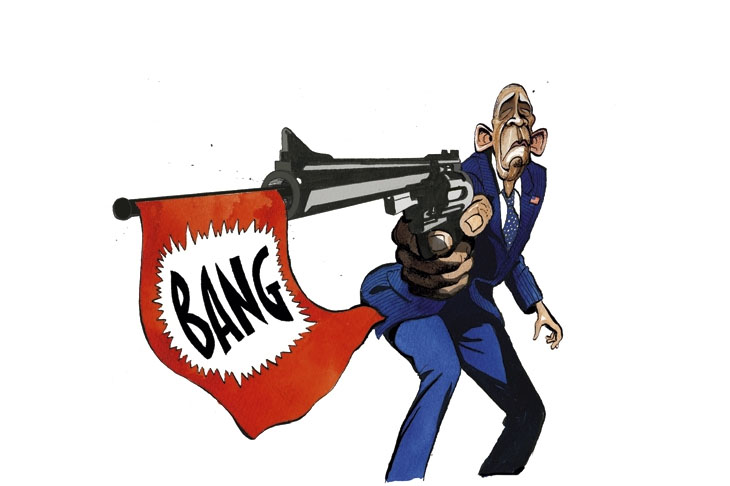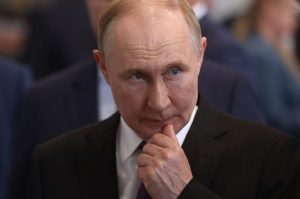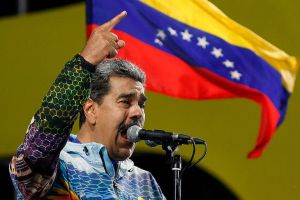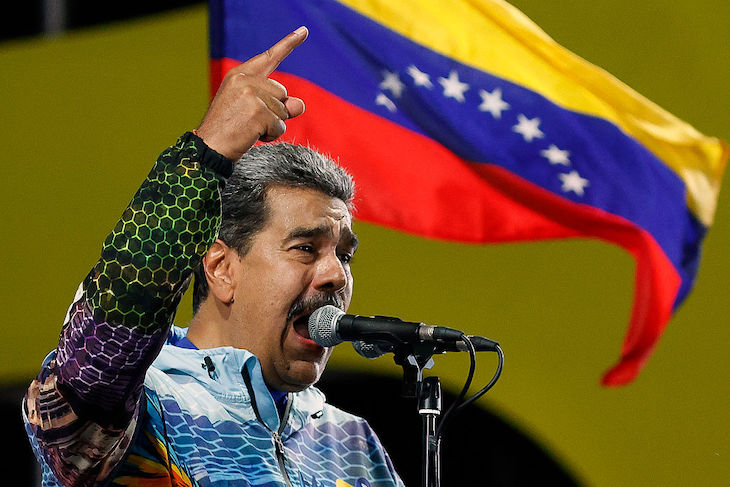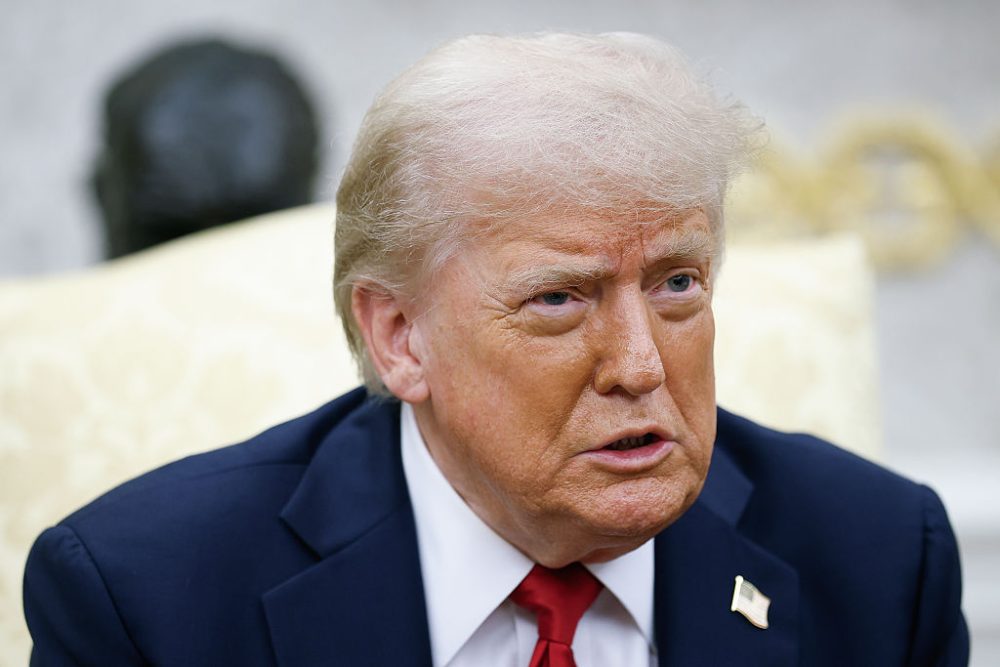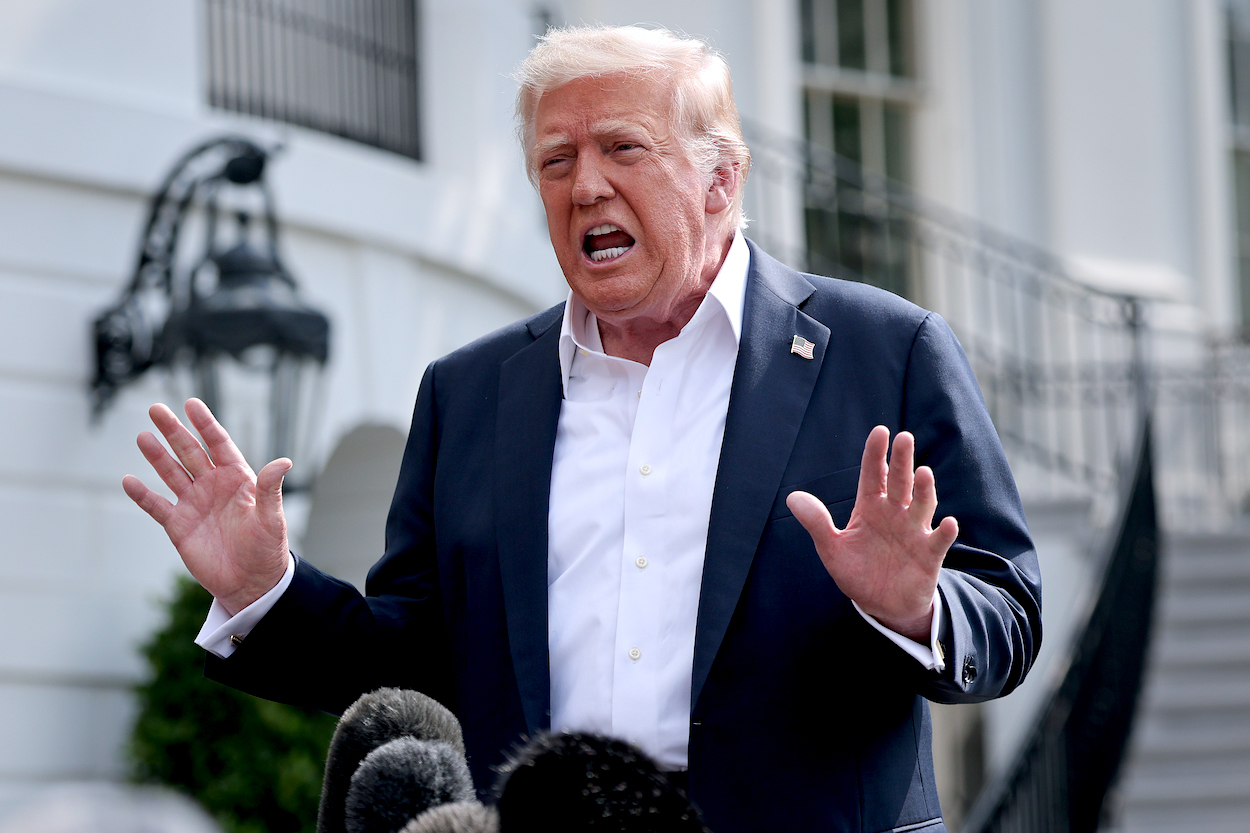It was the last week of August 2013. I was Her Majesty’s Ambassador to Saudi Arabia. The course of the Arab uprisings of 2011, which had been greeted with such naive optimism at the time, had become bloody, not least in Syria. Only the previous week there had been a chemical weapons attack on opposition-controlled areas of Damascus in the ancient oasis — the Ghouta — that lies to the southeast of the city. UN inspectors were begrudgingly and belatedly allowed access by the Syrian government. They concluded that the chemical in question was sarin. Hundreds of people had been killed, many others severely injured. Some may have been insurgents. The overwhelming majority were civilians, men, women and children, all trapped in a war between a brutal regime and increasingly radicalized and violent militias.
The Assad regime — with Russian support — claimed its opponents were responsible. No one seriously believed them. The missiles had probably been fired from Mount Qasioun, the great mountain overlooking Damascus, where the presidential palace and other regime installations were situated. Everyone knew the regime had a sophisticated chemical weapons program and significant stockpiles of missiles. Assad’s armed forces had begun to use them in 2012 and had already probably used sarin at least once before in 2013 — in Khan al ‘Asal, to the southwest of Aleppo.
It was a no-brainer. At the time Syria was not a signatory to the 1997 Chemical Weapons Convention (CWC). But the attack was indiscriminate, disproportionate to any threat and entirely unrelated to any recognizable military objective, there was no attempt to limit harm and the aim was pretty clearly to terrorize and punish civilians simply for getting in the way — and to show what awaited others who happened to find themselves in the wrong place at the wrong time. So it was probably a war crime, whatever Syria’s CWC status. The problem for western capitals, faced with a civil war between a variety of repellent actors, was what to do about it.
The outcome was shaped by two significant factors. First, the US, scarred by its experiences of attempted regime change in Iraq and Afghanistan and, faced with the disintegration of Libya, had become increasingly skeptical of any military intervention at all and wanted to wash its hands of intractable Middle Eastern conflicts. President Obama had been clear that he wanted instead to pivot to Asia, where the US was facing the most substantial challenge — from China — to its global hegemony in decades. On the other hand, he had also called for the replacement of Bashar al-Assad and backed a political process in Geneva involving the Syrian opposition which explicitly aimed at regime change. In 2012 he had also said in public that “a red line for the US” would be if “we start seeing a whole bunch of chemical weapons being moved about or being utilized. That would change my calculus. That would change my equation.”
Obama was encouraged to take a stand by British prime minister David Cameron, who — for honorable reasons — had lost little of his appetite for intervention in the Middle East in spite of the problems the UK and others were facing and the clear evidence of authoritarian resurgence across the wider region. In Riyadh Britain prepared itself for military strikes on Syria. More importantly, so did the Saudis and their GCC partners in Doha and Abu Dhabi. Even if their desired end-states in Syria were different — with the Qataris in particular favoring the Muslim Brotherhood (as they had done damagingly in Libya) — they had all been partners in the early days of the Syrian uprising in seeking to remove Assad and install a non-Alawite government which would reduce or cut Damascus’s problematic ties with Tehran. And they saw direct western military intervention in the Syrian conflict as a way to short-circuit the process.
The problem, of course, was that Cameron, who insisted on a House of Commons vote before action, had miscalculated the parliamentary arithmetic and seems to have been misled into believing that he would have enough Labour Party backing to overcome doubts among his own back-benchers. Once it became clear that he had no majority for military action, he was forced to pull out. That gave Obama, whose heart was never really in it, the perfect excuse to stand US forces down too.
Some people — most notably foreign policy realists who think the only thing that matters is a narrow definition of the national interest — claim that all this amounts to a nothingburger. The war in Syria, which continues at lower intensity, didn’t matter then and doesn’t matter now. They say that if you read his remarks carefully, Obama never actually committed the US to doing anything at all about chemical weapons in Syria. They also suggest that the subsequent deal John Kerry struck with Sergei Lavrov to sequestrate what turned out to be 95 percent of Assad’s CBW stocks (and brought Damascus into the CWC) was a brilliant success. In any case, the internal armed opposition were fragmented, the opposition in exile useless and no one seriously thought failure to act in Syria meant the US would not defend vital US interests elsewhere. In Britain some think Cameron lucky to have been saved from the consequences of his own folly — and Britain’s reduced capabilities — by the collective caution of his parliamentary colleagues.
But we don’t live in a world where what matters is the scholastic parsing of words and hidden escape clauses. Parliamentary debate is parochial: what other people believe you mean matters too. They interpret caution as a lack of will. And all decisions have consequences beyond parliamentary majorities or some short-term domestic political calculus.
The fact is that Obama led people in the region and in his own administration to believe that US-led military action would be the logical conclusion of any proven use of chemical weapons by Assad’s forces. Standing down was not an irrational decision. But neither he nor David Cameron had prepared the ground for it. So it came as a shock. And the consequences were serious and enduring. I had been in Jeddah earlier that week in August, with an old friend who was with the UN. We both thought action was imminent. So did UN HQ in New York, who wanted to get their inspectors out of Damascus urgently. So did the Saudis, who had been walked at least halfway to agreeing to support air strikes. Until the last moment they were expecting a call from Cameron to the King to confirm the details. The call never came.
When instead the news arrived that nothing would happen after all, I vividly remember Saudi dismay. After all, the strikes envisaged were designed not to overthrow Assad but, by disabling airfields and enough of his air force’s planes and helicopters, to stop him killing his own people from the air, an increasingly common regime tactic. In the following months, the use of crude and untargeted barrel bombs filled with high explosive became increasingly frequent. And in spite of the bogus deal between the US and Russia, Assad retained both the capacity and a willingness to use chlorine and, in the 2017 attack on Khan Shaykhun, sarin too.
Gulf leaders had already started to doubt the willingness of the US to protect them or even treat them with respect. They thought Obama in particular had made clear his distaste both for them and for US involvement in arbitrating regional conflicts, some of which they blamed the US for igniting. Now he had simply walked away from what they thought was a joint enterprise. More than any other, it was probably the moment when they decided they needed to start seriously hedging their bets.
The enemies of the West in Moscow, Tehran, Beijing and elsewhere saw an opportunity. And, boy, did they they take it
There have been other moments since then, all of which have confirmed them in their views: for example, the Iranian-sponsored attacks on Saudi oil facilities in 2019 and Abu Dhabi airport in 2022 (when it reportedly took President Biden over two weeks even to speak to Sheikh Muhammad bin Zaid). Iran has also been allowed to continue hijacking tankers with apparent impunity. In return, Tehran gets a sustained diplomatic effort to resurrect the JCPOA. Meanwhile, Gulf leaders continue to feel exposed and taken for granted. Is it any wonder they seek strategic balancing with China and Russia and see no reason to take western interests into account when managing the oil market or deciding to do deals with Iran — and now also Assad?
There is also to many observers a direct line from what Arabs, Iranians, Israelis, Russians and others all interpreted at the time as American weakness to the increased Iranian support for Assad from 2014 onwards and then the direct Russian military intervention in Syria — at the request of Tehran — in 2015. You could even argue (I have done so) that Russia would have been less belligerent in Africa and thought twice about invading Ukraine. My former US colleague in Baghdad and Damascus, Robert Ford, and at least one other widely respected chronicler of the war, Sam Dagher, think the West’s inaction fueled violent Islamism. Lots of other people think the same.
There are, of course, structural reasons for the US’s reluctance to play global policeman any more. Other states have become more powerful. New technologies of war have equalized the battlefield. The US military itself has suffered from two decades of conflict in the Middle East and South Asia. Europe has failed to step up to the plate. Globalization is in reverse and the economies of the West have taken a serious hit. Above all, the rise of China poses a unique challenge that deserves the undivided attention of the Washington policy elite. But the costs of the sort of intervention in Syria that we envisaged in 2013 would not have been high. There would have been a need to ensure that Assad didn’t recoup his losses. And there would have needed to be a more serious push for a political settlement on the back of it. That would have required a willingness to consult properly with people who thought we were their friends. Above all, it would have required political energy. In its absence, the enemies of the West in Moscow, Tehran, Beijing and elsewhere saw an opportunity. And, boy, did they they take it. The result has been more entropy in the Middle East, bragging rights for Putin and Khamenei and widespread distrust of American leadership at a moment when we need it more than ever. Western solidarity over Ukraine has helped restore some balance. But support for Kyiv remains fragile. NATO is fractious. And there are US elections next year. I hope we behave more resolutely, if it comes to that, over Taiwan.
This article was originally published on The Spectator’s UK website.



